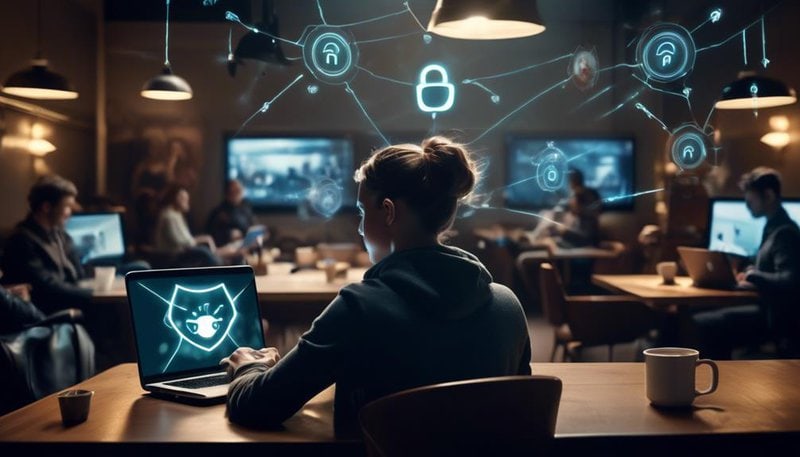How to Securely Use Public Wi-Fi With a VPN

A VPN is a powerful tool that can protect your personal information while using public Wi-Fi.
It does this by creating a secure connection that encrypts your data and shields it from potential threats.
Key Takeaways
- Using a VPN on public Wi-Fi is important for protecting personal information and creating a secure connection.
- When choosing a VPN provider, consider reliability, security features, user-friendly interface, and compatibility with streaming and gaming.
- Look for a VPN provider that offers fast and stable connections, a large server network, strong encryption, and a no-logs policy.
- Compare the security features of different VPN providers, such as encryption protocols, kill switch feature, and DNS leak protection, to ensure encrypted and secure online communications.
Importance of Using a VPN on Public Wi-Fi
To ensure secure and private browsing on public Wi-Fi networks, it's crucial to use a VPN. Public Wi-Fi networks are convenient, but they come with significant risks. Without a VPN, your data is vulnerable to interception by hackers. This puts your personal and financial information at risk.
One of the main reasons why using a VPN on public Wi-Fi is important is because of VPN encryption. A VPN creates a secure tunnel between your device and the websites you visit. This encryption ensures that your data remains confidential and can't be accessed by unauthorized individuals. It adds an extra layer of protection to your online activities and prevents hackers from intercepting sensitive information such as passwords, credit card details, and personal messages.
The risks of using public Wi-Fi without a VPN are substantial. Hackers can easily set up fake Wi-Fi hotspots, known as 'evil twins,' to trick unsuspecting users. When you connect to these networks, your data is exposed and can be easily intercepted. Additionally, even legitimate public Wi-Fi networks can be compromised, allowing hackers to gain access to your device and steal your information.
Choosing the Right VPN Provider
When choosing a VPN provider, it's important to look for reliability. You want a provider that has a strong track record of uptime and minimal downtime.
Additionally, compare the security features offered by different providers, such as encryption protocols and automatic kill switch.
Lastly, consider the user-friendly interface options available, as this can greatly enhance your overall experience when using the VPN.
Reliable VPN Providers
Consider key factors when choosing a reliable VPN provider.
For those seeking freedom online, finding the best VPN for streaming and gaming is crucial.
Look for providers that offer fast and stable connections, ensuring smooth streaming and lag-free gaming experiences.
A large server network is also important, as it allows you to access content from different regions and find the best gaming servers.
Make sure the VPN provider has strong encryption and a strict no-logs policy to protect your privacy.
Look for additional features like a kill switch and DNS leak protection to ensure your online activities remain secure.
Finally, consider the provider's reputation and customer reviews to gauge their reliability.
Security Features Comparison
When choosing the right VPN provider, ensure that it offers robust security features to protect your online activities. Here are three key security features to consider:
- Encryption Protocols: A reliable VPN provider should offer strong encryption protocols such as OpenVPN or AES-256. These protocols ensure that your data is encrypted and secure, making it difficult for hackers to intercept or decipher your online communications.
- Kill Switch: Look for a VPN that includes a kill switch feature. This feature automatically disconnects your internet connection if the VPN connection drops, preventing your data from being exposed to prying eyes.
- DNS Leak Protection: DNS leaks can reveal your online activities even when connected to a VPN. A VPN provider with DNS leak protection ensures that your DNS requests are encrypted and routed through the VPN server, keeping your browsing activities private.
User-Friendly Interface Options
To choose the right VPN provider that suits your needs, it is important to consider the user-friendly interface options available. A VPN with a well-designed and intuitive interface can greatly enhance your user experience and make it easier for you to connect to the VPN server of your choice. Look for features such as one-click connection, server selection, and customizable settings. These will allow you to quickly and easily establish a secure connection without any hassle. Additionally, a VPN provider that offers troubleshooting tips and support can be beneficial if you encounter any issues while using the service. Below is a table comparing the user-friendly interface options of three popular VPN providers:
| VPN Provider | User-Friendly Interface Options |
|---|---|
| ExpressVPN | One-click connection, server selection, customizable settings |
| NordVPN | Quick connect, server search, settings customization |
| CyberGhost | Simple interface, one-click connection, server selection |
Consider these options when choosing a VPN provider that prioritizes user experience and ease of use.
Installing and Setting Up a VPN on Your Device
You can easily install and set up a VPN on your device to ensure secure browsing on public Wi-Fi networks. Here are three steps to get you started:
- Choose a VPN provider:
Look for a reputable VPN provider that offers a user-friendly app for your specific device. There are many options available for various operating systems, including Windows, macOS, iOS, and Android.
- Download and install the VPN app:
Once you've selected a VPN provider, visit their website and download the app for your device. Follow the instructions provided by the provider to install the app on your device.
- Configure and connect to the VPN:
After installing the VPN app, launch it and sign in with your account credentials. Choose a server location from the list provided by the app, or let the app automatically select the best server for you. Once connected, your device's internet traffic will be encrypted and routed through the VPN server, ensuring your online activities remain private and secure.
If you encounter any issues with your VPN connection, such as slow speeds or difficulty connecting, you can troubleshoot the problem by checking your internet connection, ensuring the VPN app is up to date, and contacting your VPN provider's customer support for assistance.
Connecting to a Public Wi-Fi Network With a VPN
After successfully installing and setting up a VPN on your device, you can now securely connect to a public Wi-Fi network. This is an important step in protecting your online privacy and security, as public Wi-Fi networks are known for their vulnerabilities. By using a VPN, you create a secure and encrypted connection between your device and the internet, preventing anyone from intercepting your data.
To ensure a safe and private browsing experience on public Wi-Fi, here are some best practices for using a VPN:
| Best Practices for Using a VPN on Public Wi-Fi |
|---|
| Connect to a trusted VPN server |
| Enable the "kill switch" feature, if available |
| Disable automatic Wi-Fi connections |
| Use HTTPS websites and enable two-factor authentication |
Ensuring VPN Security and Privacy Settings
For optimal security and privacy, it's important to configure your VPN's security and privacy settings appropriately. Here are three important settings to consider:
- VPN Encryption Protocols:
Make sure to select the right encryption protocol for your VPN connection. The most commonly used protocols are OpenVPN, IKEv2, and L2TP/IPSec. OpenVPN is highly recommended due to its strong encryption and security features. It's compatible with various devices and operating systems, making it a versatile option for users.
- VPN Server Locations:
Choose VPN servers located in countries that prioritize privacy and have strict data protection laws. Opt for servers in locations where the VPN provider has a strict no-logs policy, meaning they don't keep any records of your online activities. This will ensure that your online activities remain private and anonymous.
- Kill Switch and DNS Leak Protection:
Enable the kill switch feature in your VPN settings. This will automatically disconnect your internet connection if the VPN connection drops, preventing any unencrypted data from being transmitted. Additionally, enable DNS leak protection to ensure that your DNS requests are also routed through the VPN, further enhancing your privacy and security.
Tips for Safely Browsing on Public Wi-Fi With a VPN
To ensure safe browsing on public Wi-Fi with a VPN, there are a few key points to consider.
Firstly, understanding the benefits and risks of using a VPN is crucial in making an informed decision.
Secondly, choosing a reliable VPN provider with strong security measures and a no-logs policy is essential for protecting your data.
VPN Benefits and Risks
When using public Wi-Fi, enhance your security by utilizing a VPN to safeguard your browsing experience. A VPN offers several benefits and also poses a few risks. Here are three key points to consider:
- Enhanced Privacy: A VPN encrypts your internet connection, preventing hackers and snoopers from intercepting your personal data. This ensures that your online activities remain private and your sensitive information, such as passwords and credit card details, stays protected.
- Bypassing Restrictions: VPNs allow you to bypass geo-blocking and access content that may be restricted in your location. This gives you the freedom to browse the internet without limitations and enjoy your favorite websites and services wherever you are.
- Potential Risks: While VPNs provide security, it's important to choose a reputable VPN provider. Some VPNs may collect and sell your data, defeating the purpose of using a VPN. Additionally, a poorly configured VPN can expose your personal information to potential breaches.
Choosing a Reliable VPN
To ensure secure browsing on public Wi-Fi, it is crucial to select a reliable VPN provider. A VPN, or Virtual Private Network, encrypts your internet connection, protecting your data from potential hackers on public Wi-Fi networks. When choosing a VPN, it is important to consider factors such as encryption strength and VPN protocols. Encryption strength refers to the level of security provided by the VPN. The stronger the encryption, the more secure your data will be. VPN protocols, such as OpenVPN, L2TP/IPsec, and IKEv2, determine how your data is transmitted. Comparing these protocols can help you find the one that offers the best balance of security and speed. Consider the table below for a comparison of VPN protocols:
| VPN Protocol | Encryption Strength | Speed |
|---|---|---|
| OpenVPN | High | Medium |
| L2TP/IPsec | Medium | High |
| IKEv2 | High | High |
Troubleshooting Common VPN Issues on Public Wi-Fi Networks
If you encounter any issues while using a VPN on a public Wi-Fi network, there are several troubleshooting steps you can take to resolve them.
Here are three common VPN issues on public Wi-Fi networks and how to troubleshoot them:
- VPN Disconnects:
- If your VPN keeps disconnecting on a public Wi-Fi network, try switching to a different VPN server.
- Sometimes, certain servers may be overloaded or experiencing technical issues.
- Additionally, check your internet connection and ensure that it's stable.
- If the problem persists, try reinstalling your VPN client or contacting your VPN service provider for further assistance.
- Slow Connection:
- If you're experiencing slow internet speeds while connected to a VPN on a public Wi-Fi network, try connecting to a different VPN server that's closer to your physical location.
- This can help improve your connection speed.
- Additionally, check if there are any bandwidth limitations imposed by your VPN service provider.
- If necessary, you can also try adjusting the encryption settings on your VPN client to prioritize speed over security.
- Compatibility Issues:
- If you're having trouble securing your VPN on different devices while connected to a public Wi-Fi network, make sure you have the correct VPN client installed for each device.
- Some VPN providers offer dedicated apps for various operating systems, making it easier to configure and connect to the VPN.
- If you're still experiencing compatibility issues, check if your VPN service provider offers any troubleshooting guides or contact their support team for assistance.
Frequently Asked Questions
Can I Use a Free VPN Service Instead of a Paid One?
You can use a free VPN service instead of a paid one, but there are advantages to using a paid VPN service. Free VPN services may pose potential risks on public Wi-Fi.
How Do I Know if My VPN Is Working Properly on a Public Wi-Fi Network?
To know if your VPN is working properly on public Wi-Fi, look for signs of a secure connection. Troubleshoot VPN connection issues by checking for encryption, IP address changes, and DNS leaks.
Are There Any Specific Settings I Need to Adjust on My Device When Using a VPN on Public Wi-Fi?
To ensure VPN compatibility on public Wi-Fi, adjust device settings. Enable VPN auto-connect, disable automatic Wi-Fi connection, and use a strong password. These measures enhance security and protect your freedom online.
Can I Use a VPN on All My Devices Simultaneously?
Yes, you can use a VPN on all your devices simultaneously. This allows you to protect your online activities on multiple devices, ensuring secure gaming and enjoying the benefits of using a VPN on all your devices.
Is It Safe to Perform Online Banking or Make Purchases While Connected to a Public Wi-Fi Network With a Vpn?
It is safe to perform online banking or make purchases while connected to a public Wi-Fi network with a VPN. To ensure the security of your personal information, use a VPN when accessing public Wi-Fi.







